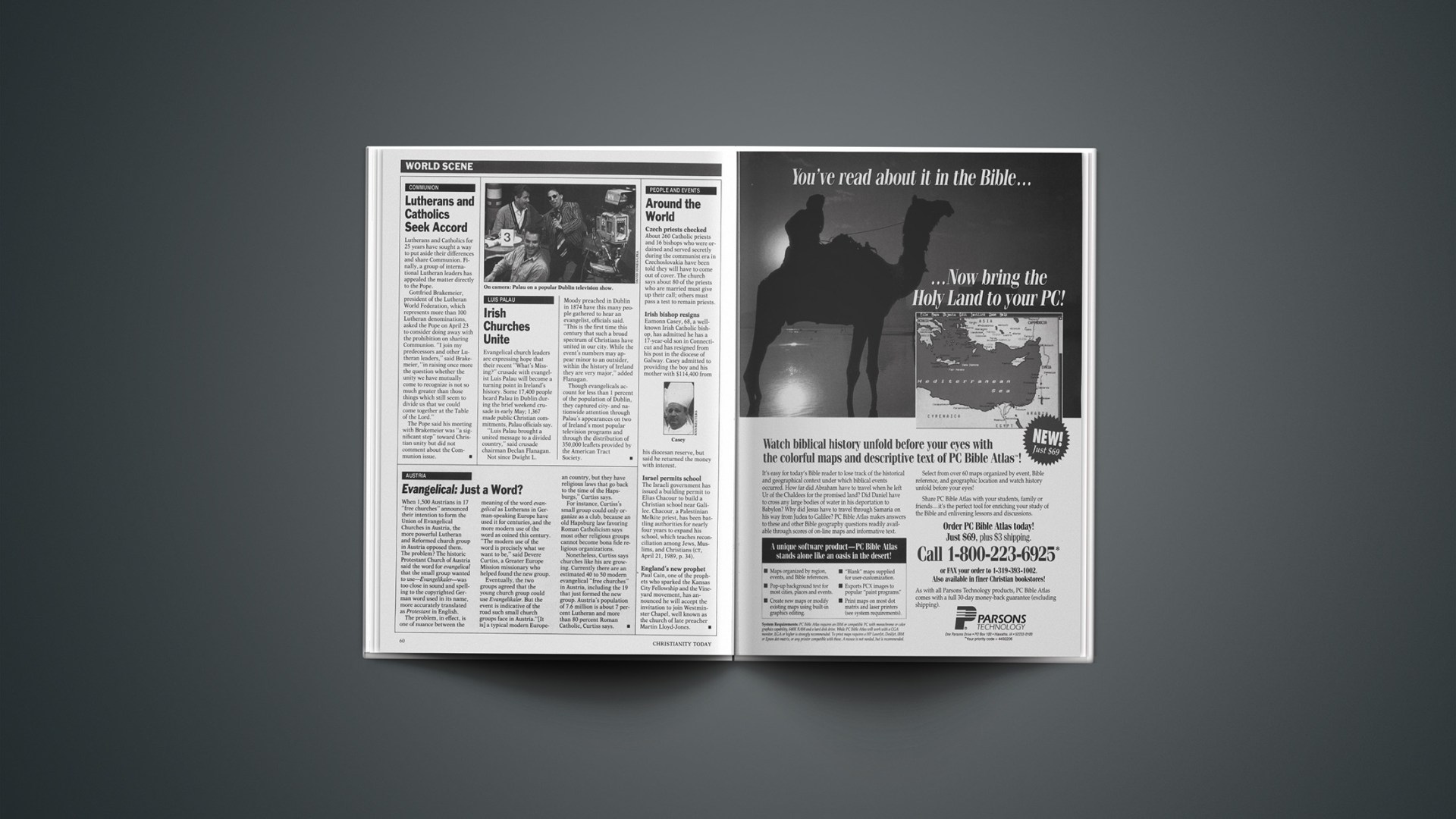Communion
Lutherans And Catholics Seek Accord
Lutherans and Catholics for 25 years have sought a way to put aside their differences and share Communion. Finally, a group of international Lutheran leaders has appealed the matter directly to the Pope.
Gottfried Brakemeier, president of the Lutheran World Federation, which represents more than 100 Lutheran denominations, asked the Pope on April 23 to consider doing away with the prohibition on sharing Communion. “I join my predecessors and other Lutheran leaders,” said Brakemeier, “in raising once more the question whether the unity we have mutually come to recognize is not so much greater than those things which still seem to divide us that we could come together at the Table of the Lord.”
The Pope said his meeting with Brakemeier was “a significant step” toward Christian unity but did not comment about the Communion issue.
Luis Palau
Irish Churches Unite
Evangelical church leaders are expressing hope that their recent “What’s Missing?” crusade with evangelist Luis Palau will become a turning point in Ireland’s history. Some 17,400 people heard Palau in Dublin during the brief weekend crusade in early May; 1,367 made public Christian commitments, Palau officials say.
“Luis Palau brought a united message to a divided country,” said crusade chairman Declan Flanagan.
Not since Dwight L. Moody preached in Dublin in 1874 have this many people gathered to hear an evangelist, officials said. “This is the first time this century that such a broad spectrum of Christians have united in our city. While the event’s numbers may appear minor to an outsider, within the history of Ireland they are very major,” added Flanagan.
Though evangelicals account for less than 1 percent of the population of Dublin, they captured city-and nationwide attention through Palau’s appearances on two of Ireland’s most popular television programs and through the distribution of 350,000 leaflets provided by the American Tract Society.
People And Events
Around The World
Czech priests checked
About 260 Catholic priests and 16 bishops who were ordained and served secretly during the communist era in Czechoslovakia have been told they will have to come out of cover. The church says about 80 of the priests who are married must give up their call; others must pass a test to remain priests.
Irish bishop resigns
Eamonn Casey, 68, a well-known Irish Catholic bishop, has admitted he has a 17-year-old son in Connecticut and has resigned from his post in the diocese of Galway. Casey admitted to providing the boy and his mother with $114,400 from his diocesan reserve, but said he returned the money with interest.
Israel permits school
The Israeli government has issued a building permit to Elias Chacour to build a Christian school near Galilee. Chacour, a Palestinian Melkite priest, has been battling authorities for nearly four years to expand his school, which teaches reconciliation among Jews, Muslims, and Christians (CT, April 21, 1989, p. 34).
England’s new prophet
Paul Cain, one of the prophets who sparked the Kansas City Fellowship and the Vineyard movement, has announced he will accept the invitation to join Westminster Chapel, well known as the church of late preacher Martin Lloyd-Jones.
Austria
Evangelical: Just A Word?
When 1,500 Austrians in 17 “free churches” announced their intention to form the Union of Evangelical Churches in Austria, the more powerful Lutheran and Reformed church group in Austria opposed them. The problem? The historic Protestant Church of Austria said the word for evangelical that the small group wanted to use—Evangelikaler—was too close in sound and spelling to the copyrighted German word used in its name, more accurately translated as Protestant in English.
The problem, in effect, is one of nuance between the meaning of the word evangelical as Lutherans in German-speaking Europe have used it for centuries, and the more modern use of the word as coined this century. “The modern use of the word is precisely what we want to be,” said Devere Curtiss, a Greater Europe Mission missionary who helped found the new group.
Eventually, the two groups agreed that the young church group could use Evangelikaler. But the event is indicative of the road such small church groups face in Austria.”[It is] a typical modern Europe an country, but they have religious laws that go back to the time of the Hapsburgs,” Curtiss says.
For instance, Curtiss’s small group could only organize as a club, because an old Hapsburg law favoring Roman Catholicism says most other religious groups cannot become bona fide religious organizations.
Nonetheless, Curtiss says churches like his are growing. Currently there are an estimated 40 to 50 modern evangelical “free churches” in Austria, including the 19 that just formed the new group. Austria’s population of 7.6 million is about 7 percent Lutheran and more than 80 percent Roman Catholic, Curtiss says.










